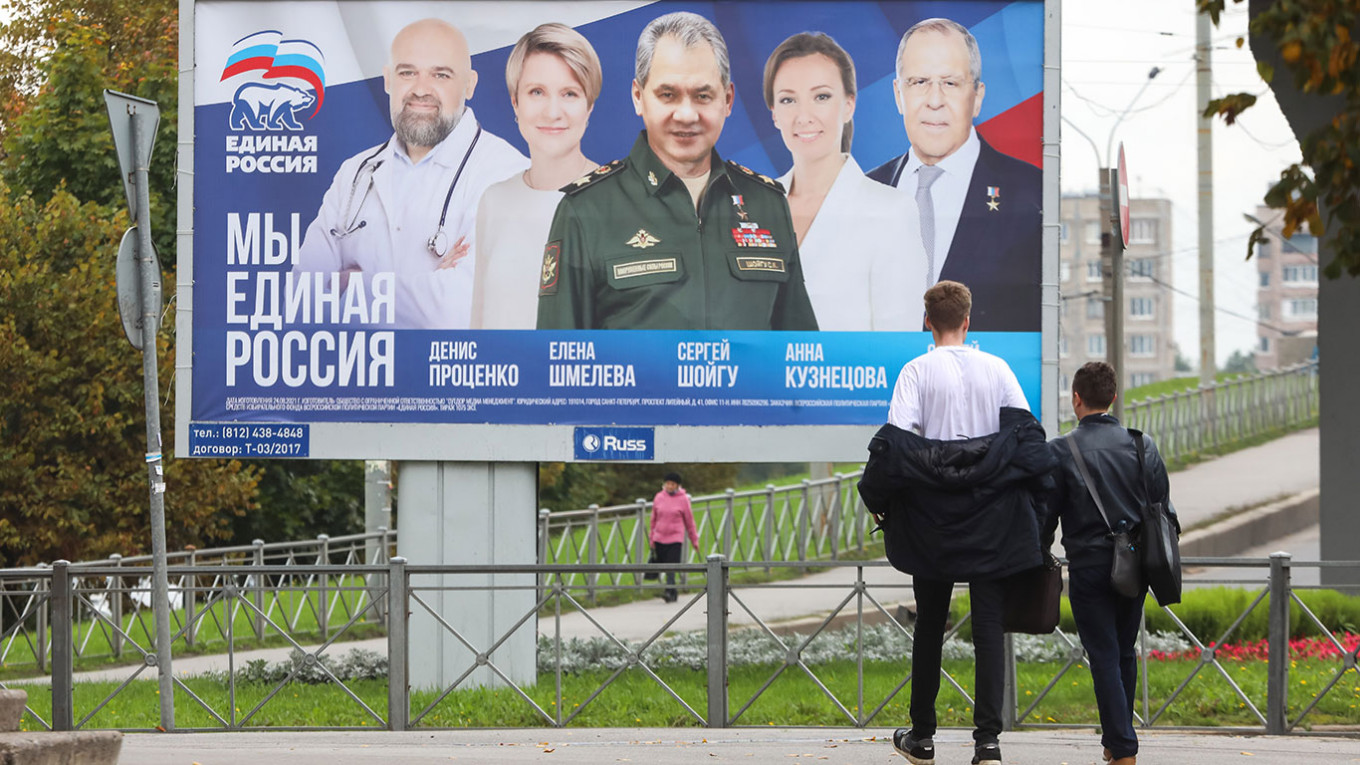United Russia retained its majority at the recent State Duma elections — or, as President Vladimir Putin put it, “reaffirmed its leadership.”
With half of the 450 seats in parliament allocated by votes for party lists and the other half through single-mandate constituencies, the ruling party won 49.8% of the votes under the party-list system, and 198 seats in the single-mandate constituencies, giving it at least 320 seats (the final results will be announced on Sept. 24).
Despite United Russia’s approval rating falling to 30% on the eve of the elections, the party has very nearly repeated its success in the last election five years ago, when it won 54.2% of the vote and over 340 seats.
That’s no mean feat considering that back then, the wave of support that followed the annexation of Crimea had not yet died down, nor had the government made the unpopular decision to raise the retirement age.
That might seem like cause for celebration, but the Russian leadership apparently thinks otherwise. The party list leaders, Defense Minister Sergei Shoigu and Foreign Minister Sergey Lavrov, weren’t at the party headquarters on election night, and didn’t even congratulate party members by video link. Nor did Putin, even though he had actively campaigned for United Russia, and had visited its headquarters in person following the last two parliamentary elections. Even the party’s official leader, former president Dmitry Medvedev, wasn’t at the headquarters (he was apparently ill).
The issue is that the Kremlin’s domestic politics bloc made the campaign a quiet and routine procedure, preferring to secure a majority by winning in the single-mandate constituencies rather than breaking records in the party-list voting. But the single-mandate candidates are local politicians and activists, while the federal list represents Putin himself and the central government, and less than 50% simply isn’t up to their usual standard.
This is why the client (the president) and the contractor (the domestic politics bloc) have differing views of the process and the result.
The president’s requirements of the Duma campaign were clear a year ago: the retention of a constitutional majority (two-thirds of all seats).
First Deputy Chief of Staff Sergei Kiriyenko said a reasonable KPI for United Russia would be 45% of the vote. It was expected that a constitutional majority would be achieved with the help of the single-mandate constituencies.
Given United Russia’s rating of about 30%, a result of 45% of the vote looked high, but overall achievable, especially with three days of voting. For opposition-minded Russians, a result of 45% wouldn’t look too outlandish: it’s less than the psychological marker of 50%, after all.
And so the task set by the presidential administration was as follows: Medvedev (not the most popular politician) would lead United Russia to victory, retaining the party’s majority. The president would likely have been satisfied with 49% of the vote, even 45%, for the United Russia party list. The task of retaining the majority would have been fulfilled, and how it was achieved would be neither here nor there.
But then the client’s requirements changed unexpectedly. At the party congress, the president ordered a new configuration of the top five names on the federal party list. Number one would be Shoigu, not Medvedev, followed by Lavrov, and in third place, by the doctor Denis Protsenko, who by his own admission was personally persuaded to stand by Putin. It was now a list of leaders from Putin’s team.
The president did what he could to boost United Russia’s campaign, touring the country, meeting with people, and granting one-off payments to various segments of society ahead of the election.
Naturally, he wanted to see a decent result in return, so the KPI was increased to over 50% and a decent voter turnout.
The elections were a triumph for Kiriyenko’s electoral machine. Like the Centre Pompidou in Paris, all the communications infrastructure of the system are displayed on its exterior.
The regional governors head the lists, to show who is responsible for the party’s result in that region. Anyone employed by the state is under strict instructions to vote, hence the long lines outside polling stations on the first morning of voting on September 17, ensuring a decent turnout right away.
In Moscow, the authorities experimented with online voting. State employees were coerced into registering for this option — so effectively that a third of all votes in Moscow were cast online.
That had unexpected consequences for the regime, however. It resulted in nearly all the pro-regime votes being counted separately, since the electronic vote tally was kept separate. Removing the loyalist votes from the traditional count meant that when votes cast in person were counted, opposition candidates were in the lead at many polling stations.
The results of online voting were only released en masse on Monday morning, creating the impression of large-scale electoral fraud. So the Moscow Mayor’s office, in trying to control state-dependent voters even more closely, only created a legitimacy problem in the capital, both for itself and for the Kremlin. So far, there have been no major protests in Moscow, but even the more or less loyal Communist Party is demanding a recount of online votes.
If United Russia’s campaign had been conducted without Putin’s involvement, the president and his inner circle would have been able to turn a blind eye to the exposure of these mechanisms for achieving the required results.
What has happened, however, is that Putin made a considerable effort during the campaign, yet it was Kiriyenko’s engineered system that won — though even it could not produce the figures that the president’s campaign should have warranted.
Moving forward, the Kremlin’s political managers will either have to bring their work closer in line with the leadership’s model, or put all their efforts into removing the president from public politics.
The party system, meanwhile, can be turned once and for all into a series of synthetic brand projects managed from the presidential administration.
This latter point is confirmed by the success of the New People party, which cleared the threshold of 5% of votes required to make it into the State Duma, meaning there will be five party factions in the parliament again for the first time in many years. Plenty of people were apparently quite happy to vote for a bare brand with no notable figures or coherent ideology.
The other new party in the running — the Russian Party of Pensioners for Social Justice—only garnered about 3% of the vote.
The new parties managed to cast doubt on whether the Kremlin’s old allies — the LDPR and A Just Russia — would clear the 5% threshold: they won just over 7% each. It seems that treating the party system as a management project works, which means that this approach of shuffling brands, colors, and slogans can be used again in the future.
Prominent figures such as TV presenters, actors, and social activists can be added as needed to the basic brands — or removed.
This applies to United Russia, too. Politics will become akin to a marketing contest, where the president does not personally take part in the battle of the brands, but merely gets the right numbers.
But Putin, it seems, is not prepared to limit himself to the role of a client for whom the necessary figures are modeled. He wants to be a leader, like before. That’s understandable: managers work for any client in theory, but the role of leader is incontrovertible.
This is why the president and his administration have such different evaluations of the Duma election results.
This article was first published by the Carnegie Moscow Center.
A Message from The Moscow Times:
Dear readers,
We are facing unprecedented challenges. Russia's Prosecutor General's Office has designated The Moscow Times as an "undesirable" organization, criminalizing our work and putting our staff at risk of prosecution. This follows our earlier unjust labeling as a "foreign agent."
These actions are direct attempts to silence independent journalism in Russia. The authorities claim our work "discredits the decisions of the Russian leadership." We see things differently: we strive to provide accurate, unbiased reporting on Russia.
We, the journalists of The Moscow Times, refuse to be silenced. But to continue our work, we need your help.
Your support, no matter how small, makes a world of difference. If you can, please support us monthly starting from just $2. It's quick to set up, and every contribution makes a significant impact.
By supporting The Moscow Times, you're defending open, independent journalism in the face of repression. Thank you for standing with us.
Remind me later.








